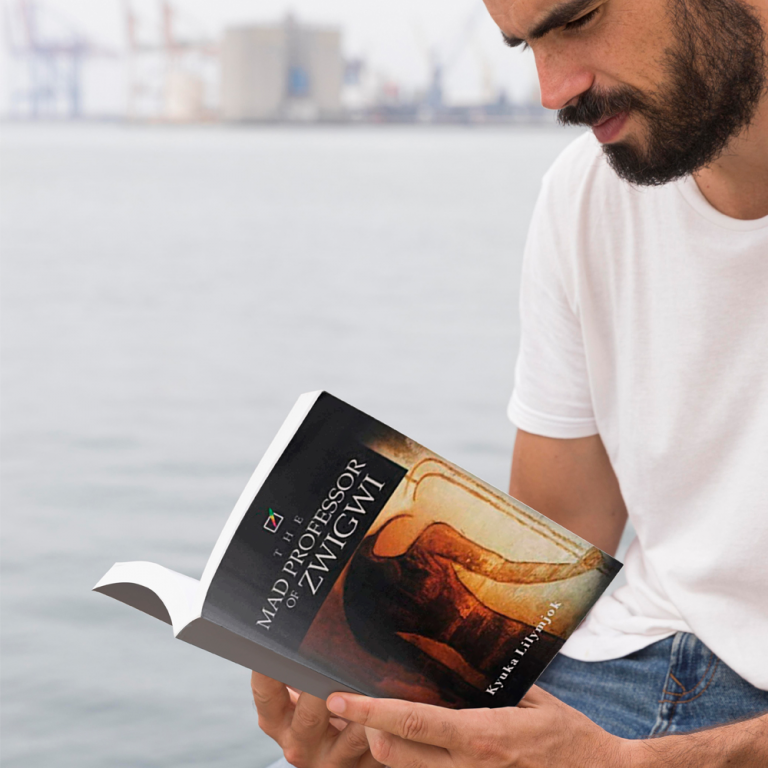Chris K. Ukande
Department of English,
Benue State University, Makurdi
Abstract
Kyuka Lilymjok is one of Nigeria’s 21st century writers who has taken the bull by the horn, as he writes to expose social ills that have thwarted the progress of Nigeria. As a committed literary writer, he has through the lens of realism x-rayed the prevalent socio-economic and political situation of the Nigerian polity in his literary works. The Heart of Jacob, his recent literary production, realistically gives a depiction of general human follies that have more or less hampered the progress of society. This paper concludes that until such social vices are eradicated from the Nigerian society in particular and Africa in general, human progress and development will remain a mirage in the country and on the continent.
Introduction
Human society is characterised by great social and political forces created by man for some selfish and egocentric reasons. In the light of this, writers depict in their literary works socio-political and economic conditions that have continuously hamper the progress and welfare of society. Kyuka Lilymjok’s commitment in realistically capturing with his pen the social and economic conditions of Tounga a fictional society which reflects Nigerian conditions is to be appreciated.
Zulu Sofola while commenting on fictional writers that seek to reflect reality said, “the artist by this fact occupies a vital place in the life of his community as a mediator between his people and their divine reality and as a motivator for the wellbeing of his people” (7). As a literary writer, what Lilymjok succeeds in doing in The Heart of Jacob, is what Walter Allen says in his following expression:
We find here a close imitation of man and manners; we see the very web and texture of society as it really exists, and as we meet it when we come into the world. We are acquainted with the motives and characters of mankind, imbibe our notions of virtue and vice from practical examples and we are taught a knowledge of the world through the airy medium of romance. (14).
The preceding excerpt demonstrates the fact that the writer through the medium of the novel is bound to carry out the task of unveiling the oddities and follies of human nature in society in concrete and realistic terms. This means that the task should be performed even at the expense of the writer’s life as he is supposed to write on sensitive issues that may hurt powerful people in society. This is the risk Alexander Solzhenitsyn took when he wrote depicting the evils perpetrated by Stalin’s despotic rule in Russia. Writing on Russia, the author opines:
I have always felt that to write about the fate of Russia was the most fascinating and important task to be performed. For my entire life, I have had the soil of my homeland beneath my feet. Only its pain do I hear, only it do I write. (30)
Often to write well about a society and the ills in such society, the writer must not only come from the society, he must have been directly affected by the social forces that bring pain to any part or the entire parts of the society. Secondly, no writer is capable of bringing sanity to a society outside his own unless he has successfully overcome inadequacies that will prevent him from attaining the passion needed to write emotionally and convincingly on the ills of the society.
The oppressed are incapable of helping themselves out of their condition of oppression. The writer owes them a duty of speaking for them so that they may be liberated.
Realism Conceptualised
Realism as a literary theory is an accurate, detailed unembellished depiction of nature or of contemporary life. It is a theory opposed to imaginative idealisation. It favours close observation of outward appearance and rejects artificiality of classicism and romanticism of the academics. It believes in objective reality and revolt against exaggerated emotionalism. Truth and accuracy are its hallmarks. Realism aims at observing situations or people and objectively documenting the daily joys and sorrows of ordinary people in society.
The concept of realism is a 19th century product with the term realism being first used in literary circles in the 1850s. This means that realism came to the fore about one and half centuries ago. This means realism as a theory pre-dates literary concepts like post-modernism, structuralism, romanticism, deconstruction and naturalism.
Luc Herman writes of the recognition of realism as a literary theory thus, “in the 1850s, a relatively small number of French, German, and English authors explicitly promote realism in their critical writings. These pragmatic realists wanted realism to be illustrated in their stories” (3). With this, Herman succeeds in throwing light on the origin and recognition of realism as a literary theory.
On his part, George Becker writes on realism thus:
It is a bundle of tendencies, some of which concern the form, others the content of the narrative. As it relates to form, it is, if you will, and in a very general way a transcription of facts, based on documents, or observation and experience. As it relates to content, it is the ability and the desire to express all aspects of life…. (4)
Becker in the above excerpt opines that a realist writer may have to rely more on observation as opposed to the romanticist dependence on invention and imagination. The realist techniques therefore seek to document human values that are quite concrete and can be verified. Realism is an aesthetic mode which broke with the classical demands of art to show life as it is by dwelling on the lives of average people in society, the common place, the middle classes and their daily struggles with the vagaries of everyday existence. The foregoing are the typical subject matters of realism.
In discussing realism, Raman Selden and Widdowson Peter have it that:
A novel may conduct a reader towards a more concrete insight into reality, which transcends a merely common sense … of things. A literary work reflects not individual phenomenon in isolation, the reader is always aware that the work is not itself reality but rather a special form of reflecting reality. (76)
Critical Realism Discussed
Critical realism is one of the branches of realism which seeks to give a complete depiction of life verisimilitude, which is the criteria by which we determine whether a proposition correspond with reality or not. Critical realism thus present situations or events that have relevance, bearing and relationship to the physical world we see around us. In a discussion that dwells on critical realism, Roger Caldwell examines it from the epistemological viewpoint. To him, he feels that a scientific text is understood as being at par with literary text. He contends:
Critical realism, then, rescues us from the postmodernist nightmare and restores us to reality. We cannot manage without the concept of truth. There is (as most of us thought all along) a pre-existing external reality about which it is the job of science to tell us. True, we must be cautious about claims to objective reality, alert to ideological distortions and aware that the world is a messier, more complicated place than the account of physicist would suggest. (222)
The above excerpt suggests that critical realism is an art that operates on the basis of a realistic conception of the natural sciences. Thus, this critical epistemological perception of the world has fundamental significance, as it postulates a distinction between the physical world (physical body and physical environment) and the phenomenal world (body, ego and environment). Expressing his thinking further, Caldwell maintains:
In memory and belief in history, referent of present thoughts is a world of things and events believed to be existentially real and independent of any intuitions, present or past. An actual past or future is not given in any datum but in perceptions. (262)
The above quotation shows that the physical world is represented more or less accurately by sensory and memory processes in the brain. At this point, one is able to distinguish between the phenomenal facts and the brain correlates. Critical realism therefore, seeks in its representation to be more comprehensive by attempting honestly to give a composite picture of everyday life and existence, and to unveil motivations that are less than admirable. Since the writer uses literature as a weapon towards depicting the realistic socio-economic and political panorama of his time and space. There is no way literature can be divorced from critical realism.
Throughout The Heart of Jacob, Kyuka Lilymjok maintains strongly a critical realistic posture of high-powered light-hearted portrayal of critical realistic elements and sometimes appears a bit docile in order to achieve his aim of making the powers that be see reason with him in the pursuit of fair play and justice in a menacing society. Kyuka’s light-hearted treatment of serious situations makes him share with Dennis Brutus of South Africa, the virtue and attribute of using love in the expression of the agonies in their respective nations. Writing on this sort of light-hearted treatment of serious situations, Adrain Roscoe has this to say:
It is remarkable that a man who has suffered the worst inhumanities which the whiteman have inflicted on Africa, including forced labour and a bullet in the back, should protest in so quiet a voice, in such measured tones, in such unpretentious verse. Where violence or screaming despair might be appropriate from an artist in Brutu’s position, his characteristic response blends dignity with patience, and calmness with reason, determined always that emotionalism must never triumph. Even when his oppressors are discomfited, we find modest joy rather than thumping triumphalism, joy that is almost embarrassed and self-conscious. (157-158)
Since critical realists concern themselves with the social panorama of their people, by using their literary pieces and artistic prowess to create awareness through a representation of life the way it is, without being prescriptive in their dealings with human conditions, Kyuka qualifies to be referred to as a critical realist writer.
Socialist realism in the Soviet Union for example, is hinged on five pillars of: truthfulness, historical presentation, representation, revolution and above all creating awareness in the people. Critical realism shares all the above qualities with socialist realism except that the former is not saddled with the task of ideological transformation and education of workers and the peasants of society. Kyuka strives to create verisimilitude in his writings and then leaves such to work on the sub-conscious minds of his readers. In The Heart of Jacob, he does not attempt to show the way forward like Femi Osofisan, Festus Iyayi, Ngugi wa Thiong’o, Sembene Ousmane and Olu Obafemi do in their writings. He is a silent achiever who with conscientious exactness employs non-violent means to achieve an exposition of the falsities of life and the inadequacies of the Nigerian society.
In a bid to present exactly human follies in the society he is writing about, Kyuka in The Heart of Jacob does not, like other Nigerian writers mentioned elsewhere in this study, takes the position of an activist, but does essentially in his writings what F. Odun Balogun describes or says of Omotoso:
Since in Omotoso’s view it is not compulsory for a writer to be an activist, the only other way for him to serve the cause of revolutionary social change is by giving moral support to progressive revolutionary elements in terms of the ideas expressed in his work. This probably implies awakening social consciousness in his readers, criticising societal ills, highlighting the situation of the wretched, insulted, injured, dejected, neglected and rejected and also satirising exploiters, oppressors and tyrants all of which actions will help undermine an inhuman system thereby paving the way for positive change. (101)
Polemics of the Text
In his presentation and representation of events in The Heart of Jacob, Kyuka makes sure of the emotional and psychological involvement of the reader, which helps in conducting the mind of the reader round the ordeal of major characters in the novel. This lends credence to Kyuka’s critical realistic presentation and representation of situations and experiences as they relate to the pathetic conditions of the villagers especially during the period of the famine caused by the locusts invasion of the village. As the author depicts the dire conditions of the villagers of Tounga as they strive to survive the scourge of famine, he by an adept use of literary devices makes sure the reader experiences with the villagers the hardship they are going through.
Kyuka’s themes in this work range from crass opportunism, greed, and lack of human compassion particularly by the central character of the novel – Jacob. The government on its part does not seem to care much. A great degree of disenchantment is portrayed as Kyuka gives a realistic depiction of the oppressive and exploitative tendencies of those with money. Using Jacob’s love for money as a point of reference in the text, Kyuka writes:
Somebody had joked that if Jacob were to faint, money should be placed on his chest to resuscitate him instead of the cold water usually thrown on a person that has fainted. If it was feared he had died, money should be shaken by his ears and if he did not stir then he was dead and nothing could bring him back to life. (14)
Jacob takes advantage of a situation he should show pity by lending money to famished villagers with staggering interest rates. Speaking to his carpenter younger bother to be as opportunistic as himself by making and keeping coffins, Jacob said, “everything has its season and wise men ride on the season to become rich. This is the season of death. It is up to you who is well placed to take advantage of the season and become rich” (17).
He prides himself as a vulture who feast on men when they are most vulnerable. According to him, “the issue today my brother is what can earn money. If you are to pray for anything at all, pray for money because eventually even the Reverend Father will ask for money before he prays to God to have mercy on your soul when you die” (18).
When his brother tells him that people have been saying behind him that he is a bad man, Jacob replies:
Let me tell you something my brother,’ said Jacob, from ancient times, children had thrown stones and wooden missiles at the mango tree to pluck mangoes. Sometimes the leaves of the mango tree and its fruits are plucked by the children’s missiles, but the tree survives the missiles to bear fruits again. A war of stones and wooden missiles therefore does not destroy the mango tree. I am a bad man, fine; but that is why I am still alive. Most of my age mates who tried to be good are long dead. The world, if you don’t know, is a rotten place and tolerates only rotten people. You are my younger brother; but if you go on trying to be good the way you are, you will likely die before me. (p.35)
To Jacob’s reply, his brother says:
You have gotten away with evil deeds and you are beginning to think you are the favoured child of the devil, isn’t it?’ asked the brother. ‘Well, let me tell you something Jacob; it is not the day a man sleeps with the herbalist’s wife that he develops elephantiasis of the scrotum. It is much later. (35)
What his brother says does not in anyway disturb Jacob as he continues with his opportunistic life of a vulture. All those who exploit the vulnerability of others to make money – vulture funds, are the unknown vultures the writer refers to. Unknown, they wear Plato’s Gyges ring that makes them invisible and perhaps invincible. We see some of these attributes in Jacob the unknown vulture in Kyuka Lilymjok’s The Heart of Jacob. He even boasts of his incinbility thus:
… children had thrown stones and wooden missiles at the mango tree to pluck mangoes. Sometimes the leaves of the mango tree and its fruits are plucked by the children’s missiles, but the tree survives the missiles to bear fruits again. A war of stones and wooden missiles therefore does not destroy the mango tree. (p.35)
The unknown vultures are those with the heart of Jacob – an opportunistic heart. Those with the heart of Jacob always operate with a sleight of hand and often in the dark. Jacob wore the skin of an animal to trick his father into blessing him. He wrestled with an angel in the dark and forced him to bless him. It is these traits we see in the Jacob of Kyuka Lilymjok’s The Heart of Jacob. This Jacob stealthily releases his pigs to feast on other peoples fields of cocoyam. (p.62). People even suspect him to have brought the locusts that brought the famine so that he could benefit from it by lending money to the people at prohibitive interest rates. ‘If it were only fore-knowledge my heart would not be seething the way it is now,’ said the first man. ‘It might be that Jacob brought the locusts so as to profit from the calamity.’ (p.30).
Stressing the importance of exploiting situations, Jacob says:
What is important is for my brother to know we will all be unable to earn a living if we don’t feed on each other’s miseries. The doctor to me is a vulture feeding on the diseases of other men. So is the lawyer feeding on the troubles of others. The barman feeds on the spirit of drunkenness in the drunk. The Reverend Father would not eat if there were no sinners. Our stomachs move all of us to feed on carrions of different kinds. Without all those things we consider bad providing a livelihood, life would be impossible. We are all vultures my brother if you don’t know. (18)
While conversing with his younger brother, Jacob asserts that, “fortune is a woman if you don’t know. You have to woo her well before she agrees to marry you” (20). He goes on to say the world is a place of opportunities and not of sentiments. ‘‘No one eats sentiments; but we are all fed by the opportunities we have exploited” (28).
Desiring to control people and have them do his bidding, Jacob sees money as the means of doing this: “money is the instrument you use to control people. When you part with it without strings the way he had done today, you lose control of the person you have parted with the money to” (45-46). “There was nothing he cherished like people coming to his house, bowing before him, seeking one favour or the other” (46). The sense of power money gives him makes him develop a sub-conscious mind of master-servant, king-subject paternalistic attitude in his interaction with people.
Often Jacob “would sit on his chair acknowledging greetings from people passing by while a faint smile of satisfaction hung from his lips” (46), In his daily interaction with fellow villagers who usually come to him seeking one financial assistance or the other, Jacob basks in the power that money gives him over his fellows.
Jacob knows that the world is a grossly selfish world” (47), where everyman is to himself and God for us all. Since no one is looking out for him, he has to look out for himself.
The Heart of Jacob also dwells on the insensitive posture of government and governance that affects Tounga the setting of the novel. Government’s lack of care is well depicted in the novel in the visit to the cemetery by the earth priest and members of the community, where one of them exclaims that, “like locusts, our government has no mercy” (63). “Locusts come to steal and plunder. I suspect when locusts attack they create a thieving tendency in the people they leave behind. The people begin to behave like the locusts. Locusts like barbarians leave behind a culture of looting” (63).
For government to perform, the people need to insist it performs. But out of fear, the people seldom do this. Ayuk one of the characters in the novel however says that, “we ought not fear the teeth the government bares at us. Government is like the hyena. It fears you even as it charges at you” (64).
A voice in the novel further laments that, “even the government is opportunistic. It is taking advantage of the ignorance and docility of our people to steal our money, ripping the people off without the rebuke of conscience – that is if people in government in this country have conscience” (66). The above is a realistic depiction of the situation in many countries around the world. In most countries particularly developing countries like Nigeria, governments often behave like predators feasting on their citizens.
Kyuka in The Heart of Jacob beams his literary searchlight on activities of the courts and the police. The sort of picture Kyuka paints of the judiciary in his text reminds one of its prototype that Franz Kafka presents in The Trial. In The Trial, Kafka dwells on the ordeals of the protagonist of the text, known as Joseph K., a senior bank clerk. He is unexpectedly arrested by two unidentified agents of the law under circumstances that can best be described as highly unfortunate for an offence he knows nothing about. He is not however, taken away, but left at home to await instruction from the authorities that be.
Joseph K. later visits the court on invitation where he pleads his case. But to his surprise, he finds in this kangaroo court pornographic pictures instead of law books. He returns home and is visited by his uncle who is a friend of a lawyer. The uncle who seems distressed by his situation asks him to visit the lawyer for a possible bail-out of his situation. K. discovers to his amazement that the advocate is a capricious and unhelpful character. He returns to his bank and finds that his colleagues are trying to undermine him. All efforts to justify himself prove abortive even when one of his bank clients advises him to see Titorelli, a court painter who is believed to have judicial connections, and knows the workings of the judiciary and its processes. K. learns through Titorelli’s knowledge that not a single defendant has ever been acquitted in the court K. is standing trial.
The court as Kafka depicts it is an inhuman and a bureaucratic embodiment of injustice. It is a system run by corrupt humans who inevitably corrupt the law for their selfish ends. The judiciary together with its law courts make the whole process of justice dispensation a paradox as most if not all the lawyers and judges involved in the process of administering justice lust for money.
The more K. tries to free himself from the court, the more he finds himself dragged deeper into its web. His fate attests to the desolate wisdom that we are always before the law. Anyone who thinks he can exist outside, or without or beyond the law is deluded. Since Joseph K. could not escape the claws of the law, he finally surrenders even though he does not still know what his offence is. On the day of his thirtieth birthday, two men arrive to execute him. He offers little resistance suggesting he realises his execution to be inevitable. They lead him to a quarry where he is killed like a dog.
Narrating the ugly experience of K. Kafka takes the reader through the scenario K. is taken to a quarry at night by two unknown assassins, where he narrates thus:
Then one of them opened his frock coat and out of a sheath that hung from a belt girt round his waistcoat drew a long, thin, double-edged butcher’s knife, held it up, and tested the cutting edges in the moonlight. Once more the odious courtesies began, the first handed the knife across K. to the second, who handed it across K. back again to the first. K. now perceived clearly that he was supposed to seize the knife, as it travelled from hand to hand above him, and plunge it into his own breast. But he did not do so; he merely turned his head, which was still free to move, and gazed around him. (285)
To complete the description of what the assassins started doing to K., Kafka again narrates that:
But the hands of one of the partners were already at K.’s throat, while the other thrust the knife deep into his heart and turned it there twice. With failing eyes K. could still see the two of them immediately before him, cheek leaning against cheek, watching the final act. “Like a dog!” he said; it was as if the shame of it must outlive him. (286)
In theory the police are friends. In practice this theory is not always carried. Whether one is the complainant or the accused, police always make sure they squeeze something out of anyone that has gone to the law or has been taken to it.
Jacob sitting alone and cringing at the prospects of going to the police or the court for protection laments thus:
… now both the police and the courts were moneylenders and pig merchants like him looking for opportunities to squeeze money out of anyone in distress seeking their assistance. If he reports to the police, before they give him the protection he needed, the people would have descended on his house and carted away all he had. The court was even worse. It would take him ten years to get judgment from the court and he would have to feed the judge and his court clerks for all these years. It was far cheaper to feed the village for two weeks than the judge and his court for ten years or even more. (70)
The pig merchant and money lender further laments: “trying to get justice from the court is like trying to draw water from a well with a sieve. There is no point asking a blind man to find a needle for you or a cripple to fetch water for you from the river” (89).
Jacob’s attitude towards his people in the village that is more or less refractory earns him the hatred of his community. The opportunistic judgment passed on him by the chief and the excitement the people greeted it shows clearly the desire of his community to hit back. With this judgment, he proves not the mango tree a war of missiles does not destroy. Instead he proves:
… the foolish farmer that nailed his ears against the warnings of an imminent rain in his blind commitment to get wealth from the soil,’ said Adubu. ‘The rain winked at the foolish farmer by way of lightning, but he did not see. By thunder, the rain shouted at him, but he did not hear. It began to pinch him by drizzles; but he refused to feel the pinch. So the rain with big ice blocks came down heavily upon the farmer and thrashed him mercilessly. Jacob is a man whose love for wealth hearkens to no warning.’ (p.145).
In the end, it turned out for Jacob the way his younger brother had said: ‘‘it is not the day a man sleeps with the herbalist’s wife that he develops elephantiasis of the scrotum; it is much later.’’ (p.41) Jacob gets the just desserts he richly deserves and the whirlwind he well merits.
Conclusion
In this study, we have discussed critical realism to show how The Heart of Jacob qualifies Kyuka Lilymjok as a critical realist writer. We have done this by looking at Kyuka’s presentation and representation of facts and events in The Heart of Jacob. The body of this study reveals that Kyuka uses his novel through content and form to make critical-realistic comments on Tounga community which could be any community in Nigeria.
As far as content is concerned, the study reveals varied thematic concerns. These themes revolve around human follies and vanity. In this text, Kyuka Lilymjok is not a socialist writer in the mould of Ngugi, Iyayi, Obafemi, Ousmane and Osofisan, but his work shows that a writer can champion social change without calling for political action. This he can do by giving moral support to progressive elements through ideas he expresses in his work. This Kyuka does in The Heart of Jacob by exposing the parlous condition of the people and indicting the exploiters and the oppressors.
Works Cited
Allen, Walter. The English Novel. Great Britain: Penguin Books, 1970. Print.
Becker, George. Realism and Modern Literature. New York: Frederick Ungar Publishing Col. 1980. Print.
Caldwell, Roger. Critical Realism –Epistemological Model Gestalt Theory. Essex: Peterloo, 2003. Print.
Herman, Luc. Concepts of Realism. Candem House: Columbia, 1986. Print.
Kafka, Franz. The Trial. New York: Vintage Books, 1925. Print.
Kyuka, Adamu. The Heart of Jacob. Ibadan: Evans, 2009. Print.
Moody, Christopher (ed). Solzhenitsyn. Perennial Library, New York: Harper and Row, 1967. Print.
Odun, F. Balogun. “Populist Fiction: Omotoso’s Novels’’. In African Literature Today, vol.13, 1983. Print.
Roscoe, Adrain. Uhuru’s Fire: African Literature East to South. London: Cambridge University Press, 1977. Print.
Selden, Raman and Widdowson, Peter. A Reader’s Guide to Contemporary Literary Theory. Kentuck: Kentucky Uni-Press, 1993. Print.
Sofola, Zulu. The Artist and the Tragedy of a Nation. Ibadan: Caltop Publishers, 1994. Print.










